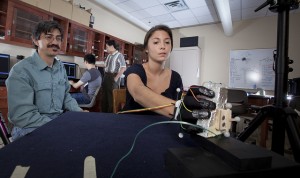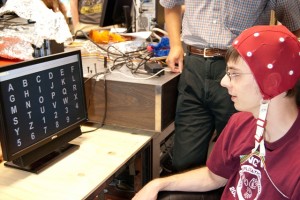
Professor Luis Schettino and Camille Borland ’13 demonstrate the wearable glove.
The College has received a $142,000 grant from the National Science Foundation that will help faculty and students bridge engineering and the natural sciences through interdisciplinary research and coursework.
The funds, acquired through the work of Yih-Choung Yu, associate professor of electrical and computer engineering, Lisa Gabel, assistant professor of psychology, and Luis Schettino, assistant professor of psychology, will purchase a biopotential measurement system. This equipment measures the voltage difference among points in living cells, tissues, and organisms and can be used to develop new devices and treatments to improve the quality of life of individuals suffering from neurological disorders.
“There are countless challenges in neural science and engineering that rely on a strong collaboration between neuroscientists and engineers to solve the problems,” says Yu. “This grant provides us with the finances needed to purchase a state-of-art system that could strengthen our interdisciplinary research collaboration.”

David Salter ’12 demonstrates how the brain-computer interface works.
Over the past year, Yu and Schettino have worked with electrical and computer engineering major Zhao Xin Yin ’13 (Shijiazhuang, China), neuroscience major Camille Borland ’13 (Verona, N.J.), and other students to develop a computerized, wearable glove that studies human grasping behavior. This glove registers the exact time of finger-object contact at a high resolution and could be used on a wide range of applications including keyboards, video game controllers, touch-screen devices, and even prosthetics.
Yu and Gabel are working with electrical & computer engineering majors Tony Lorence ’13 (Cumbola, Pa.) and David Salter ’12 (Bethlehem, Pa.) and neuroscience majors Christopher Angeloni ’12 (Sykesville, Md.) and Victoria Corbit ’13 (Reading, Pa.) to study the patterns of brainwaves by using a computer application that can be controlled with a person’s mind. The field of brain-computer interface (BCI) technology has the potential to treat neurological diseases such as ALS, stroke, and paralysis and improve the lives of people who have such conditions.
“This research program offers unique opportunities for our students that typically would only be available at larger universities,” says Gabel. “It is exciting to create a research group that allows students to work together across disciplines, and which has real applicability.”
Yu explains that the BCI project is in need of a high-end instrument to acquire the EEG signal more precisely and effectively. This stronger signal will allow them to design an interface for a user to control a robot by “thinking.” For the research of human grasping behavior, this new instrument will allow them to measure some signals, such as EMG and EOG, that are currently unavailable due to the limitations of equipment. These additional signals will let the research team better understand grasping behaviors in future research.
“Modern science and engineering challenges are usually involved with multiple disciplines, but it is difficult to introduce this type of challenge in traditional class settings,” says Yu. “This equipment allows neuroscientists to acquire neural signals in good quality. It will provide more accurate neural information for engineers to design and operate machines that can interact with humans more effectively.”


1 Comment
Comments are closed.